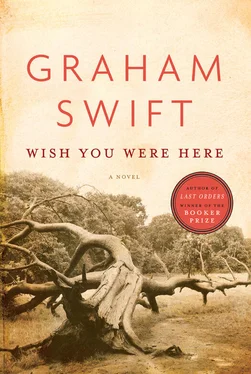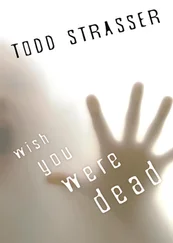The other two soldiers were called Pickering and Fuller. Before this event and throughout its duration it never quite got home to Jack that these men, having been privates, would have been in his brother’s charge. He had among the relatives a technical, proxy seniority. But he felt like the lowest of the low.
The bearers stood for a moment at the foot of the ramp, close to the padres, while the officer for the bearer party took his place behind the coffin. Then a single muffled bass drum began to beat the rhythm of the slow march, followed by a muted growling of brass instruments, and the coffin was carried along a carefully planned route so that it passed in front of the heavyweight uniforms on the platform — all standing at a salute — then in front of the civilian party, before delivery to its hearse.
When the drum began, Jack felt it was being struck inside his chest, and though he was required to do nothing more than stand and look, he couldn’t prevent his arms going stiff at his sides, the thumbs pointing downwards, he couldn’t prevent himself lifting his chin and pulling back his shoulders and coming to an instinctive, irresistible attention. This he did for all three coffins. And the fact was they were all the same. They were, all three, just Union-Jacked boxes borne on six shoulders and looked interchangeable. This was both bewildering and unexpectedly consoling. Each coffin received an equal and undiscriminating fullness of attention, as if there might have been a bit of each man in each box.
But Tom’s coffin, Jack realised, had a genuine distinction in being last. There was nothing else now, in reserve, on which the onlookers might unload and exhaust their emotion. It was the final chance for everyone to focus their feelings. It was also, specifically, why Jack was here.
The bugle sounded again, for Tom’s coffin. It was a recognisable bugle call, though Jack couldn’t think of its name: Reveille. When it sounded, some second person inside him, it seemed, gave a little inner cry. He hoped that none of the group in front would now turn and give him, however well intended, sympathetic looks. None did. They were looking at Tom. They were thinking of Tom for him.
The drum was pounded again. In the minutes that followed, almost every remembered moment he’d spent with Tom seemed to flow through him in a way he couldn’t have predicted, willed or even wished. Yet he was also aware of all the time they’d not spent together. He thought of the letters he’d written to Tom, with great difficulty, and the letters he’d never written. And the letters he’d never got back. He thought of the things that had and hadn’t passed between them and that, perhaps, didn’t matter now. The things that Tom had never known and the things that he, Jack, had never known. He had gone into caravans. Tom had gone into battle.
He thought of the last time he’d stood like this — though it wasn’t like this at all — at his own father’s funeral, when Tom wasn’t there. The whole village saw that Tom wasn’t there. But Tom, everyone knew by then, was in the army. He thought of how he would have to stand there again, very soon — he would have to go through it all again. He thought of those Remembrance Days. Marleston churchyard. The grey and yellow lichen on the memorial, the rasp of leaves. He thought of how if he was required, following this ceremony, to make a speech, he would say how Tom, his little brother Tom, had always wanted to be a soldier, ever since he’d learnt about his two great-uncles who’d died in the First World War and how one of them had won the DCM. Or some such crap. He’d say it. Though thank God that he didn’t have to make a speech. How could he, Jack, ever make a speech? How could anyone ever make a speech? But he’d brought that medal with him. He couldn’t say why. He could hold it up, for effect, in his speech. He touched it now in his breast pocket.
He thought of the bar in the Crown. Jimmy Merrick in a suit. He thought, or tried to think, as he’d tried to think many times before now, of Tom’s last moments, but he couldn’t think of them, couldn’t imagine them, his mind flicked away. He thought, as the coffin passed directly in front of him and he wanted to touch it, to be one of the six bare-headed soldiers or somehow all of them: what would his mum think — his and Tom’s mum — to see both of them now?
When all three coffins had been transferred to their hearses a tense silence remained. This was, Jack understood, a pre-arranged part of the proceedings (it was like those Remembrance Days), but it was also like a natural, inevitable response. How could this thing simply end? After delivering the coffins, the parties of bearers had formed up, each in two ranks with their officers before them, beyond the hearses, at an angle to them, like some third, flanking group of onlookers. Then a separate detachment of soldiers, with rifles, had formed up in front of the hearses.
By now Jack had noticed that the three drivers of the hearses were not (of course) alone, each had — what would you call them? — a co-driver. It was a mark of respect and standard practice. No man should be asked to drive a corpse across the country alone. Alone, as it were. But Jack had imagined Tom’s hearse having a solitary driver because he’d imagined that driver being himself. Each pair of drivers stood now, erect and still, by the rear of each hearse. Had they been instructed to do this? Was it regular undertaker’s training?
Major Richards had explained that there would be rifle shots — it was a tradition of the regiment and had been done in the Peninsula (an old foreign war). But, even with their preparatory commands and drill, the shots came like jolts. The relatives again seemed to buckle, as if they were being fired at themselves. The noise of the shots rattled round the sky — even this big wide sky — as if it couldn’t find a way out, the echo of the last shots still trying to flee as the next were fired.
Then it was over. The whole thing was, as it were, stood at ease and dismissed. The army had discharged its obligations and returned these three soldiers to their civilian claimants. Repatriation was complete.
Even now, for a moment, the civilian group seemed not to want to move. Then it began an impetuous, almost mutinous surge towards the hearses. Having seen, till this point, only the backs of heads, Jack noticed now several tear-stained, choked and ravaged faces. He saw handkerchiefs. He also noticed several cameras being fumblingly produced and held up. He thought of Major Richards’s words. If I were you. But he felt like scum for even imagining he might now simply peel away. He was caught in the general drift. And there were the hearse drivers to acknowledge.
But none of those things, Jack knew, was what impelled him. He wanted to be near the coffin, as near as he could get. He wanted to touch it. The previously solemn and restrained gathering of relatives was now milling round the three hearses like visitors let into some show. The drivers stood back like mere attendants. So too did all the military personnel. It seemed that this was one part of the programme that had not been rigorously planned. The cameras flashed and clicked. The names — names and nicknames — of the other two soldiers were suddenly being called, like strange animal cries. Jack felt he could not open his mouth now to say the word ‘Tom’—he had done the right thing, perhaps, to say it in the car in the car park — but he was saying it inside. He felt like scum, nonetheless, because all the attention was on the other two hearses, all the name-calling was directed at them. Because they had those tributes of flowers. Because his drivers, the pair of them, must surely be ashamed to be driving his hearse, to have got this job of the three.
Читать дальше








![Питер Джеймс - Wish You Were Dead [story]](/books/430350/piter-dzhejms-wish-you-were-dead-story-thumb.webp)



